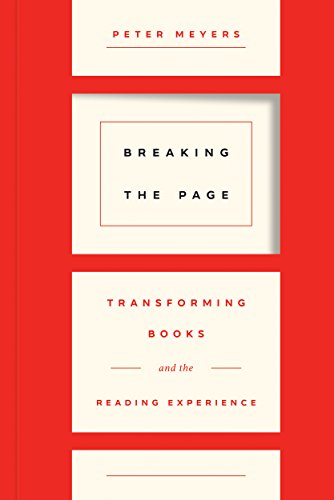Breaking the Page Summary

6 min read ⌚

Transforming Books and the Reading Experience
Let us guess: you’re reading this on your mobile phone or on a tablet.
But, wait a minute, you say: that was as easy as guesses go! After all, you don’t even have a hardcopy version of your website summaries! (Quick mental note: there should be one! The title writes itself: “100 Best GetNugget Summaries: Read a 100 Books In 1 Book’s Time”).
And, that’s the interesting part!
If we did have this summary in a hardcopy form, especially if it was beautifully designed, chances are you’d prefer that one. Why?
In “Breaking the Page”, Peter Meyers scrutinizes the reasons.
And we have them summarized for you here.
Who Should Read “Breaking the Page”? And Why?
When eBooks first arrived, the publishing industry went into a DEFCON 2 kind of frenzy. Understandably so: people expected that eBook readers spelled the end for traditional books. Fortunately for them, they were wrong: for some reason, people still like traditional books better.
Read “Breaking the Page” if you like to uncover the reasons behind this. Read it particularly if you are in the publishing business since Meyers offers a glimpse into a future where eBooks are a bit more competitive.
Finally, read it if you are interested in mild futurism – there are some things here you will definitely find interesting.
About Peter Meyers
Peter Meyers is a freelance journalist and author, specialized in writing about the world of digital publishing. He has written numerous articles on eBooks and related matters (the effect of computers on conventional culture) for publications as respected as the “Wall Street Journal,” “New York Times,” and “Wired.”
is a freelance journalist and author, specialized in writing about the world of digital publishing. He has written numerous articles on eBooks and related matters (the effect of computers on conventional culture) for publications as respected as the “Wall Street Journal,” “New York Times,” and “Wired.”
In addition to “Breaking the Page,” he has also written the self-explanatory “Kindle Fire HD: The Missing Manual.” You can find some of his opinions at http://newkindofbook.com/.
Breaking the Page Summary
If you think about it, eBooks have many competitive advantages over traditional books.
Let’s go over the most obvious three:
First of all, they are virtual, so they don’t take up any real space. You can fit millions of them in your Kindle or on your iPad or on your computer. You’ll never have that many physical books in your life unless you’re really, really rich. Or, unless you’re working in the library. (By the way, have you tried packing a million books when traveling?)
Secondly, they are much more customizable and searchable. This is especially good for researchers (try searching an indexless book!) or those with eyesight problems (you can’t change the font size in a traditional book).
Finally, they are a lot cheaper and they arrive instantaneously if bought from Amazon or eBay.
Now, here’s the catch:
Peter Meyers, a digital book lover, and impresario says they are still inferior to traditional books.
Especially when it comes to fiction!
Because, you see, fiction is all about the text. And you can’t really arrange blocks of text as easily on an eBook reader. Have you noticed how carefully we’re breaking down our summaries into smaller chunks? That’s because, on the screen, you can’t follow large blocks of text.
That reminds us: time for a one-line bucket brigade.
Because this is where it gets interesting!
If this is true, says Meyers – and science says it is – then eBooks and traditional books aren’t really competitors. They are something different that should focus on different things.
In other words, both eBooks and traditional books have their weaknesses. In the case of traditional books, there’s not much you can do about them. But, in the case of eBooks – you can!
So, why do people – both publishers and readers – insist on treating eBooks as replicas of traditional books? This stops either from seeing that eBooks can do so many things better!
Which are they?
Well, the main reading problem nowadays is the lack of concentration. People are less and less focused and interested to get to grips with books Victorian-style, so they try to find techniques to master faster reading.
eBooks are practically perfect for that!
Meyers suggests that they can be designed in a way which would allow a person to read in any of the three possible ways: fastest (skimming), fast (grokking), slow (mastering).
How?
Just turn the book chapters into a simulated stack of cards. On the front side, there will be a brief outline of the chapter, on the backside its content. Skimming would be achieved by running through the cards’ front sides, grokking by turning over only the ones you’re interested in, and mastering by reading the book regularly, from start to finish.
But, that’s only the beginning!
What about multimedia? Traditional books can’t insert a video of a person explaining Einstein’s theory of relativity between paragraphs! eBooks can. And, if you ask Meyers, they should.
They should also organize eBook libraries better. You can’t search through thousands of traditional books looking for an information, but it’s easy to do this with eBooks. Then, why isn’t it implemented?
Just imagine what an eBook Google would mean for that thesis you’ve been delaying!
Speaking of writing:
This may be an area where it would be good to treat eBooks as replicas of traditional books. Anyone who has researched something understands perfectly the need for taking notes, and linking paragraphs.
So far, unfortunately, eBook designers seem to have not really cared that reading is as much about notetaking as it is about glancing through chunks of text.
And they should start caring immediately!
Key Lessons from “Breaking the Page”
1. Traditional Books Are Here to Stay… But So Are eBooks
2. eBooks Shouldn’t Be Replicas of Traditional Books
3. The Potential of eBooks
Traditional Books Are Here to Stay… But So Are eBooks
When eBooks first appeared, everybody expected that it’s the end of traditional books. Now, many people think that eBooks are just a passing fad.
But, it’s safe to say that, even though most of the people prefer printed copies, there are just about enough who prefer the screen to the paper.
And there are reasons to believe that this will always be so.
eBooks Shouldn’t Be Replicas of Traditional Books
Traditional books have some serious advantages over eBooks. Like, for example, fetishistic aspects, such as the smell of paper or the sound of first opening a book. Or, even more, the ease with which you can read a 500-page novel on paper, as opposed to the discomfort you might experience if you need to read the same book on a Kindle.
However, the opposite is true as well: eBooks are better than traditional books in more than one aspect. Design and multimedia freedom, customizability, searchability – to name just a few possible attributes.
In other words, eBooks are virtual and will lose if they try to imitate traditional books. They will gain a lot if they think of themselves as something different from traditional paper books.
The Potential of eBooks
And this is where it gets interesting: the potential of eBooks is so far both under-researched and theoretically limitless. In fact, in twenty years, eBooks have evolved more than traditional books in two millennia.
The latter, however, are perfect as they are. The former, on an evolutionary scale, are merely Neanderthals.
Like this summary? We’d Like to invite you to download our free 12 min app, for more amazing summaries and audiobooks.
“Breaking the Page” Quotes
I wanted to trace out more than just what our devices make possible. I wanted to draft plans for what modern readers need. Share on X The ever-churning eBook factories put millions of titles within immediate reach. Share on X The digital screen is an infinite canvas, unconstrained by paginated boundaries. Share on X In the digital realm, my delight is born of possibility more than of what has actually been produced to date. Share on X I hope this book helps others make books that make you happy. Share on XOur Critical Review
Ironically, there are many people who have read “Breaking the Page” in a paperback format. And this something Peter Meyers has a serious issue with. Because, as he says, eBooks have an enormous potential which has never been used.
The problem:
For some reason, people still think of eBooks as printed books transformed into pixels. They are not, and they should never be, he says. And then he goes on a short enlightening excursion into the future of digital publishing.
And some of his ideas – such as multimedia eBooks, slack-of-cards eBooks, searchable eBook libraries – are not merely great, but quite doable even now. Who knows? Maybe Meyers will be looked at by future generations as a sort of a digital book Jules Verne.
Until then, this is the book to be inspired from!








